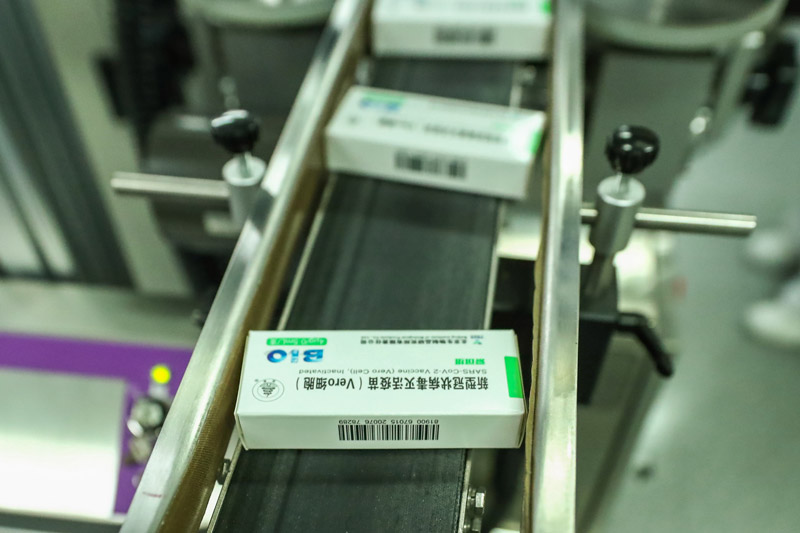A trip to the border between China and North Korea ③ Ji ‘an: Rock Capital and 700-year Kingdom.

In October, 2021, the sculpture of "Big Guitar" beside Binjiang Leisure Square in Ji ‘an, Jilin. The pictures in this article are all Matt diagrams.
I will leave Dandong for Ji ‘an along the Puyi Palace in Dandong.
On August 9, 1945, the Soviet army entered the northeast, and Puyi went to Ji ‘an from Xinjing (now Changchun), the capital of the puppet Manchukuo, to prepare to flee to Japan through Korea, and he would spend 10 days in his life. There have been many such days before, and there will be more later.
On August 13th, Puyi stopped at Dalizigou Mining Institute of Dongbiandao Development Co., Ltd. near Linjiang in the north of Ji ‘an. On the 15th, Japan surrendered, and on the evening of 17th, in the miners’ canteen, Puyi announced his abdication for the third and last time in his life, and the Kantian dynasty of Manchukuo ended. On the 19th, Puyi arrived in Fengtian (present-day Shenyang) through Tonghua, was arrested by the Soviet troops who occupied the airport by air at Dongta Airport, and then was escorted to Chita (present-day capital of post-Baikal Territory of Russian Federation).
Five years later, when the Korean War broke out, the advance team of volunteers first entered North Korea from Ji ‘an for reconnaissance. Ji ‘an county was established in 1902, taking the meaning of "Your Majesty acceded to the throne, saved the world and set up an China" in Biography of Historical Records and Sima Xiangru. In 1965, in order to take care of North China’s national sentiment, the South Korean government renamed Ji ‘an Ji ‘an. In 1985, Ji ‘an was under the jurisdiction of Tonghua City, and in 1988, Ji ‘an established a city (county-level city).
coach
There is no direct train from Dandong to Ji ‘an, only a 4320 train from Dandong to Tonghua, which leaves the next day. Although the scenery along the train is wonderful, it doesn’t match my travel time, so I choose to take a long-distance bus instead.
In the era when high-speed rail is becoming more and more convenient, long-distance buses are becoming rare in first-and second-tier cities, but in small cities and rural areas, they are more convenient and flexible modes of transportation. Now high-speed railway station is far away from the urban area, and most of the long-distance bus stops are still in the city center. When passing through the mountainous areas of villages, long-distance buses will stop at any time according to the needs of passengers, which is an irreplaceable function of trains.
I like listening to drivers and bus captains chatting on long-distance buses. They will pay attention to the recent increase in vegetable prices, the situation in the Taiwan Strait, the poor economic development and employment situation in Northeast China, and finally the topic will always fall on their bus operation.
During my trip, there were only single-digit passengers at the starting station, and villagers occasionally hitchhiked during the four or five-hour journey, and the fare was only a few dollars. I understand that drivers have to carry a lot of goods to earn a little hard work. Apart from a small amount of personal express delivery, many of those goods are ingredients and engineering items in village shops along the way. As these buses are fixed trains, pulling goods is the main income of those drivers.
Our bus passed Hunjiangkou Bridge halfway, which is the confluence of China-Korea border and Liaoning-Jilin border. Hunjiang is the ancestral home of the Jurchen people in Jianzhou, once called Tongjiajiang. Tong Jia is a Manchu surname. The Tong family was originally a prominent family of Han people in Liaodong, and they had a good relationship with Jurchen. Emperor Kangxi’s mother and imperial concubine were both from Tong Jiashi. He ordered Tong Jiashi to be changed from the Eight Banners of Han Dynasty to the highest yellow flag.
"Big Guitar" Sculpture
In this city, which is famous for its world cultural heritage on the border between China and North Korea, I have to look for a very new landmark first: the "big guitar" sculpture.
In the movie Sewing Machine Band, the cement guitar sculpture in a fictional rock park exists as a symbol of idealism. This movie, with the theme of rock band, takes place in Ji ‘an, and the local people also know the shooting scene. But maybe it’s just because the director himself is from Ji ‘an. The rock capital in the movie has nothing to do with Ji ‘an in reality. The driver was also confused when I asked if there was a local band performance venue and asked if I was a KTV or a bar resident.
I walked to the riverside leisure square by the river, and a huge guitar sculpture was set up next to the square, but not the one in the movie. The guitar sculpture in the film was demolished in the plot. Later, the Ji ‘an municipal government suddenly realized the influence of this film and felt that it might attract young artists to travel here, so it really built a "big guitar" sculpture.

In October, 2021, next to Binjiang Leisure Plaza in Ji ‘an, Jilin, the landmark building "Big Guitar" sculpture in the night.
The "big guitar" in the movie is made of concrete, and its appearance and tone are relatively calm. Now, in order to cooperate with the light show, it has been changed into a pure white and more modern shape, and its position has also changed. At night, there is no rock music performance in Binjiang Leisure Square, only a square dance that is uniform and not lost to Arirang on the other side.

In October, 2021, Ji ‘an, Jilin, was the riverside leisure square at night, and in the darkness in the distance was North Korea on the other side of the Yalu River.
In 2004, 43 sites (42 in Ji ‘an) of Koguryo’s royal city, tombs and noble tombs were listed in the World Cultural Heritage List. The city of Ji ‘an is completely attached to the Koguryo site. The former Koguryo Capital Domestic City happened to be in the core block of Ji ‘an City.
With Goguryeo Ruins Park as the center, the ruins of domestic cities are all over the city, surrounded by the ruins of gates, city walls, turrets and drainage culverts. The city wall made of rectangular stones is surrounded by wooden fences, and there are many old people exercising beside the drainage culverts of the west city wall. Next to the Wenmen of Dongcheng wall is Ji ‘an Morning Market, but the Goguryeo Ruins Park in the center of the city itself has no ruins, and it is purely a fitness and leisure park.
Walking along the city wall is like walking in a big park, because many sites are in residential areas. It is also a rare experience to touch the world cultural heritage as soon as you get downstairs.

In October, 2021, Ji ‘an, Jilin, was the site of Koguryo National City in the urban area.
Wandu Mountain City Fortress
The next morning, I arrived in Marudo Mountain City. At that time, it was cloudy and slightly cold, which was very suitable for climbing mountains. The taxi driver told me that I didn’t have to go into the mountains, so I just had a look outside by car. That was probably the aesthetic fatigue of their locals.
In the eyes of people who don’t understand, there are no large-scale architectural remains in this mountain. It seems that there is nothing to see, just a pile of stones and graves. But people who know it will know that Marudo Mountain City is a fortress of repeated tug-of-war between Koguryo and the Central Plains regime in Liaodong and the northern part of the Korean Peninsula, from the Han Dynasty to the Tang Dynasty.

October, 2021, Ji ‘an, Jilin, Koguryo Marubu Mountain City Site.
After the Han Empire conquered Weiman Korea, it set up four counties in Liaodong, and named the place where the native nationalities in Northeast China lived as Koguryo County, which was under the jurisdiction of Xuantu County. In 37 BC, Go Jumong, the prince of Fuyu (an ancient nation who lived in the northeast of China from the Han Dynasty to the Tang Dynasty), was pushed away and established an independent country, Koguryo, in Zubenchuan, which is now Wunv Mountain in Huanren, Liaoning Province, which is referred to as Juli in Chinese classics. In AD 3, Koguryo moved the capital to the domestic city, which is now Ji ‘an, and built Wei Na Yan City as the acropolis on the mountain, echoing the domestic city. This echo of two cities on the mountain and below is the characteristic of Koguryo city, and the ancient cities on the Korean peninsula also have this design, which is a defense habit in war-prone areas.
In 197 AD, Gongsun Du, the Eastern Han Dynasty Liaodong satrap, attacked Goguryeo, and the present Marubu Mountain City was expanded and renamed by the 10th King "Mountain King" to resist Gongsun Du’s invasion. Goguryeo joined forces with the Cao Wei regime to fight against the Gongsun family, but soon after, the two sides turned against each other. From 244 to 245 AD, Wu Qiujian, an assassin from Youzhou of the Cao Wei regime, went on an expedition to Goguryeo and destroyed Marubu Mountain City, but Goguryeo soon rebuilt the city.
In 311 AD, during the reign of Meichuan King, Goguryeo was in a strong position in the northern part of the Korean Peninsula and began to counterattack. By the time of Guangkai King, it occupied all the land east of Liaohe River. However, at this time, China entered the great division period from Wuhu Sixteen Countries to the Southern and Northern Dynasties, and new opponents appeared one after another. The first confrontation with Goguryeo was the Qianyan regime. In 342 AD, Murong Mu, the founding monarch of Qianyan, attacked Goguryeo and destroyed the Marubu Mountain City again. Fortunately, at this time, there are only 30 years left before the most ambitious monarch in Koguryo’s history succeeded to the throne, and Koguryo is about to enter its heyday.
I got off and walked to the foot of Marudo Mountain. For a long time, it was forgotten in the wilderness because of the blockade outside the customs. Until 1906, when the road was built, the "Buqiujian Ji Gong Monument" was discovered. The inscription recorded the historical facts of the expedition to Koguryo mentioned above.
The mountains in the east, west and north of Marudo Mountain City are steep, with broad and gentle flat land in the middle and low terrain in the south. The city wall is built on the cliff in the south and surrounded by a moat. I am the only one in the whole Marudo Mountain. The layout in the mountain city is very simple, and the number of buildings is not much. The palace is the center, but only the cornerstone remains, as well as the watchtower and the garrison station.

October, 2021, Ji ‘an, Jilin, Koguryo Marubu Mountain City Site.
There is a small lotus pond in the mountain city. There is a story about this lotus pond. In 28 AD, the Han Empire attacked Goguryeo, and the third monarch of Goguryeo, King Dawu, stuck to Marubu Mountain City. The Han army hoped to make Goguryeo surrender by siege. King Dawu caught a carp from the lotus pond and wrapped it with aquatic plants and sent it to the military camp of the Han army. When the Han army saw the carp and aquatic plants, they thought that there was enough water and food in the city to be besieged, so they withdrew.
Walking out of the mountain city, I came to the Koguryo cemetery at the foot of the mountain. I was too relaxed and happy along the way. The mountains in the distance fluctuated and birds echoed, and there were tombs nearby.

In October, 2021, the Koguryo aristocratic tombs at the foot of Marudo Mountain in Ji ‘an, Jilin Province.
Koguryo advocates thick burial, and the exterior of the mausoleum is piled into a cone with multiple layers of stones. In this cemetery, we can see the characteristics of Koguryo’s tombs in different historical periods: some of them are lined with strips of stones at the bottom and covered with gravel; Some of them are built directly with large stone strips; There is another kind, which is closer to Han tombs, that is, mounds.
Koguryo people believe in natural polytheism, so the murals in the tombs here mostly depict the gods of the sun and the moon. Later, Buddhism was introduced to Koguryo from the Central Plains, and Koguryo began to believe in Buddhism. Koguryo civilization influenced the whole Northeast Asia in later generations. It can be said that this mountain is the land of Longxing in Northeast Asia.
Haotai tomb and Changshou tomb
After leaving Marudo Mountain City, I went to two tombs in the urban area: Haotai Mausoleum and Changshou Mausoleum, which were developed as the core scenic spots of Koguryo Ruins in Ji ‘an. King Haotai and King Changshou were father and son. During their reign (AD 391-491), Koguryo’s national strength reached its peak.
Haotai Mausoleum is a small scenic spot, mainly visiting tombs and tombstones. When I entered the cemetery, the first thing I saw was the famous monument of King Hao Tai. The huge monument was covered by a glass wall room, but I could walk in and visit it. The full name of this monument is "The Monument to King Haotaiwang, whose land is wide open in Guogang", which records Koguryo’s founding history, King Haotaiwang’s life achievements and information about the laws and regulations of grave keepers, the most important part of which is the story of King Haotaiwang’s conquering everywhere during his reign.

In October, 2021, Ji ‘an, Jilin, the monument of King Haotai in Koguryo remains scenic spot.
Haotai Aric Tan De was born in an era of crisis in Koguryo. Shortly after his birth, his father, Koyilian, was killed in a battle with Baekje. Baekje was ambitious for the control of the Korean Peninsula. At this time, the Houyan Murong family who occupied Liaodong often threatened Koguryo. King Haotai, who succeeded at the age of 17, faced the risk of being attacked by both the north and the south.
King Haotai showed his superb strategic mind at this time. He pretended to surrender to Hou Yan to the north to avoid confrontation, and first solved the threat of Baekje in the south. King Haotai led the army to defeat Baekje many times and established his absolute superiority on the Korean Peninsula. At this time, Houyan was facing the attack of the newly rising Northern Wei Dynasty, and Goguryeo no longer obeyed Houyan. After defeating Houyan’s attack in a row, Wang Faqi fought back and occupied Liaodong. During this period, Japan began to intervene in the situation on the Korean Peninsula, and Baekje tried to form an alliance with Japan. King Haotai attacked Baekje again and drove Japanese forces out of the Korean Peninsula.
Go along the path after the monument to the Great King, and you will come to the foot of the tomb. Haotai Mausoleum looks not high from the flat ground, but it has a large area, surrounded by gentle slopes, and the terrain is open, and there is a step that can walk to the door of the tomb. Different from the tomb in Han Dynasty, the tomb is set underground, with a sealed mound above it, and the tomb of Haotai Mausoleum is at the top of the tomb.

In October, 2021, Ji ‘an, Jilin, the Haotai Mausoleum in Koguryo Ruins Scenic Area.
I walked up the steps to the tomb and came to the door of the tomb. The opened tomb was built with large strips of stone, but the top and the outside of the tomb were surrounded by broken stones, and some stones were scattered at random, which was different from the tomb of his son Changshou Wang that I saw behind me. Perhaps it took too much energy to dig stone tablets, so the tomb itself was a bit ordinary.
Walking down from Haotai Tomb, I went to Changshou Tomb. Perhaps in order to build a tourist city, although Ji ‘an has a small urban area, it has introduced a developed shared electric car. Except Marudo Mountain, other scenic spots can be visited by electric car, which is very convenient.
Changshou Mausoleum is located 1.5 kilometers east of Haotai Mausoleum, which is called "Oriental Pyramid" in tourism propaganda. Tourism propaganda is always misleading. When a mausoleum is called the Oriental Pyramid, people will inevitably compare it with the pyramids in Egypt. In fact, the mausoleum is not very tall, but it looks like a pyramid.

In October, 2021, Ji ‘an, Jilin, was the tomb of Changshou in Koguryo Ruins Scenic Area.
Walking in front of the tomb of Changshou, it is not difficult to find that the construction technology of this tomb is obviously more advanced and advanced than that of Haotai Tomb. The tomb of Changshou Mausoleum is built into a square cone by huge stone strips layer by layer, and there are seven steps step by step. A huge tombstone is placed around the tomb and pressed on the outer wall to offset the outward force caused by the weight of the stone above and protect the tomb from collapse. As far as the building itself is concerned, there is obviously no connection between this mausoleum and the Egyptian pyramids. The volume difference between the two is too great, and the mausoleum is completely piled up by large stones and needs lateral protection, which is different from the Egyptian pyramids.
In AD 413, the 19-year-old son of King Haotai, Changshou Aric Lian, ascended the throne. He reigned for 78 years and died at the age of 97. In ancient times, a long-lived old man was regarded as a human being, and a long-lived monarch was a symbol of the prosperity of the country.
The Longevity King continued the expansion policy of his father, King Haotai. In order to contain the gradually powerful Northern Wei Dynasty, Goguryeo supported the Beiyan regime. When Beiyan perished, Goguryeo’s army covered the evacuation of clans and people in the Longcheng of Beiyan National Capital. In the year before the Northern Wei Dynasty launched a war of subjugation against Beiyan, Changshou Wang sent envoys to visit the Northern Wei Dynasty to request the imperial edict. Later, although Goguryeo supported Beiyan, it caused dissatisfaction in the Northern Wei Dynasty. However, with the death of the last monarch of Beiyan, the two sides reconciled, and Goguryeo not only accepted the conferment of the Northern Wei Dynasty regime, but also accepted the conferment of the Southern Liu and Song Dynasties, maintaining a stable and balanced relationship between the North and the South.
During the Southern and Northern Dynasties, the Central Plains regime began to take "Korea" as the abbreviation of Koguryo, and Koguryo gradually took "Korea" as the official title. In order to prevent the invasion of the Northern Wei Dynasty and suppress Baekje and Silla better, in 427 AD, Changshou Wang moved the capital from Ji ‘an to Pyongyang. When he captured Baekje and occupied the Hanjiang River Basin on the Korean Peninsula, Goguryeo’s territory reached its peak.
Ride an electric car from Changshou Mausoleum and return to the city center, passing through some small aristocratic tombs along the way. There used to be a mural exhibition hall here, but it is no longer open. Tomb murals can be seen in Koguryo Museum. In 1997, the Koguryo Mausoleum in Ji ‘an was stolen, and the director of Ji ‘an Korean Cultural Center was also involved. Many murals were smuggled to South Korea, and some were destroyed in the excavation. Later, some China scholars discovered Koguryo cultural relics when they visited the museum in South Korea, and asked for them in vain.
Special tenderness
The Yalu River in Ji ‘an is very narrow, and people who are good at swimming come from the other side for dozens of times. At six o’clock in the evening, there was no one on the street in Ji ‘an. Looking across the bank, the North Korean side was more pure black.
During the day, the taxi driver took me to the port, opposite the city of Manpu, North Korea. The cement factory aided by the Soviet era was still working in the thick smoke, and the mountain was bare. The driver said that North Korea was worried that someone would escape, so it cut down all the mountains to facilitate surveillance.

In October, 2021, Ji ‘an, Jilin, Manpu City, North Korea, on the other side of Yalu River, the border river between China and North Korea, was a cement factory aided by the Soviet era.
Ji ‘an always gives me a different flavor from other cities in Northeast China, especially neat and orderly. Cars always give way to pedestrians, and even the morning market is very regular. Breakfast stalls and other stalls selling vegetables, meat and aquatic products, and mountain products specialties have their own positions and are clearly separated. At a certain moment, such a civilized scene gave me the illusion of acting. Looking at the neatness and order of Ji ‘an, I wonder if this norm is also the ideal state that the other side of the river yearns for.

In October 2021, Ji ‘an, Jilin, was a morning market in the urban area.
But not everyone appreciates this specification. A taxi driver told me that the city’s economic situation is not good, and the real estate development that has been heated up around North Korea’s reform and opening up has always been a dream. After the epidemic, basically only tourists from the province came. What doesn’t match the high-level world cultural heritage is the lack of entertainment services that can retain tourists’ consumption. Moreover, the history of Koguryo is relatively unpopular, and many tourists just stop by to see the ruins and go to other places to stay. When the government was unable to develop the economy, it began to attach importance to the construction of civilization. Although the local people enjoyed cleanliness and order, they also had a tired response.
In this way, what I see is more like "we are very happy here, and only happiness is allowed."

In October 2021, Ji ‘an, Jilin, when night fell, there were no people on the street.
But in my feelings as a foreigner, Ji ‘an has a special gentleness. Perhaps because of the vigorous development of tourism construction, its public service facilities are completely high-level even compared with first-tier cities, with clean streets, clean and adequate public toilets, clear and perfect tourist guide signs, and Koguryo Museum with unique appearance. This public museum is charged, which is rare. The advantage is that there is no reason not to open on Mondays, which is more convenient for tourists to arrange their time.
In addition, the natural environment here is very pleasant, with mountains and rivers, warm in winter and cool in summer, and long T-shirts in late autumn during the day. No wonder Koguryo built the capital here. This place is very suitable for literary and artistic creators to move in for a short time, concentrate on their work, climb mountains when they are tired, and walk by the river.














































































